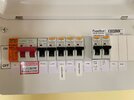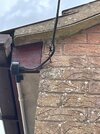Hello all,
I'm thinking of getting an EV, as I drive quite infrequently and it's mostly town/local runs. I've seen a pretty cheap Renault Zoe that ticks all my boxes.
My garage has power and I've recently had a new consumer unit fitted to main house. The garage power is taken overhead from my CU as my garage is adjacent to my house. The armoured cable which takes power to the garage was replaced when I had the CU updated.
I've included pictures as I am not sure how best to describe the setup. My questions are:
1. Would it be relatively easy for a professional to install a 7kw wall charger inside the garage with my current setup or would it be more involved that just using the existing feed?
2. If a wall charger was prohibitively expensive, would an inline charger be able to be used? Renault don't seem to recommend this but many people use them, I understand they are not as efficient as a dedicated wall box and pose their own safety concerns if not used properly. I imagine I would only need to charge once a month if that, but rather than 30 hours at 3Kw I'd probably top up every couple of days for an hour or so. Although I don't know what would be the most optimum given this less than ideal setup.
If going this route I was planning on upgrading a socket in the garage using the one below:
Coupled with this in line charger:
Many thanks for any advice. If it's all a big no no then I'll stay away from the whole idea but thought I'd try and get some informed answers before going any further.




I'm thinking of getting an EV, as I drive quite infrequently and it's mostly town/local runs. I've seen a pretty cheap Renault Zoe that ticks all my boxes.
My garage has power and I've recently had a new consumer unit fitted to main house. The garage power is taken overhead from my CU as my garage is adjacent to my house. The armoured cable which takes power to the garage was replaced when I had the CU updated.
I've included pictures as I am not sure how best to describe the setup. My questions are:
1. Would it be relatively easy for a professional to install a 7kw wall charger inside the garage with my current setup or would it be more involved that just using the existing feed?
2. If a wall charger was prohibitively expensive, would an inline charger be able to be used? Renault don't seem to recommend this but many people use them, I understand they are not as efficient as a dedicated wall box and pose their own safety concerns if not used properly. I imagine I would only need to charge once a month if that, but rather than 30 hours at 3Kw I'd probably top up every couple of days for an hour or so. Although I don't know what would be the most optimum given this less than ideal setup.
If going this route I was planning on upgrading a socket in the garage using the one below:
Coupled with this in line charger:
Many thanks for any advice. If it's all a big no no then I'll stay away from the whole idea but thought I'd try and get some informed answers before going any further.







